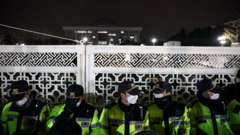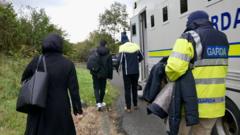South Korean President Yoon Suk-yeol shocked the nation on Tuesday night by declaring martial law, a move unprecedented since 1979 and unseen since the country became a democracy in 1987. The unexpected declaration, announced in a late-night broadcast, cited “anti-state forces” and North Korean threats, but was quickly revealed to be driven by Yoon’s own political challenges.
The martial law order temporarily placed the military in charge, with troops and police deployed to the National Assembly. The military issued a decree banning protests, political activity, and placing media under government control. Helmeted troops entered the parliament building, creating a tense atmosphere that drew immediate criticism from politicians across the political spectrum.
Opposition leaders, particularly Lee Jae-myung of the Democratic Party, called on citizens and lawmakers to converge on parliament and challenge the declaration. Thousands of protesters responded, gathering outside the heavily guarded parliament, chanting “No martial law!” and “Strike down dictatorship.”
Yoon’s political troubles have been mounting. Since April, when the opposition won a landslide election, his government has been unable to pass desired legislation. His approval ratings have plummeted to around 17% due to various corruption scandals, including controversies involving the First Lady and allegations of stock manipulation.
The current political landscape saw the opposition preparing to slash a major government budget bill and move to impeach cabinet members and top prosecutors. These actions likely contributed to Yoon’s desperate move to declare martial law.
However, the declaration was short-lived. Lawmakers, including some from Yoon’s own party, immediately condemned the action as illegal and unconstitutional. Within hours, parliament convened, with 190 of its 300 members voting to invalidate the martial law order.
Despite the military’s presence and announced restrictions, protesters and politicians defied the orders. Media continued to report normally, and no widespread suppression of civil liberties occurred. By early Wednesday morning, Yoon had no choice but to accept the parliamentary vote and lift the martial law declaration.
Experts view this event as a significant challenge to South Korea’s democratic institutions. Leif-Eric Easley from Ewha University described it as a “legal overreach and political miscalculation” that risks damaging the country’s economy and security.
The incident has stunned South Korea, a country proud of its democratic progress since its dictatorial past. Some protesters even called for Yoon’s arrest, suggesting potential future political consequences for the embattled president.
The speaker of parliament’s statement, “We will protect democracy together with the people,” encapsulates the national response to Yoon’s unprecedented and ultimately unsuccessful attempt to impose martial law.
This event represents one of the most significant challenges to South Korean democracy in decades, potentially more damaging to the nation’s democratic reputation than other recent global political upheavals.




